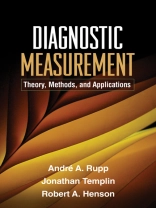This book provides a comprehensive introduction to the theory and practice of diagnostic classification models (DCMs), which are useful for statistically driven diagnostic decision making. DCMs can be employed in a wide range of disciplines, including educational assessment and clinical psychology. For the first time in a single volume, the authors present the key conceptual underpinnings and methodological foundations for applying these models in practice. Specifically, they discuss a unified approach to DCMs, the mathematical structure of DCMs and their relationship to other latent variable models, and the implementation and estimation of DCMs using Mplus. The book’s highly accessible language, real-world applications, numerous examples, and clearly annotated equations will encourage professionals and students to explore the utility and statistical properties of DCMs in their own projects. The companion website (www.guilford.com/rupp-materials) features chapter exercises with answers, data sets, Mplus syntax code, and output. Winner–Award for Significant Contribution to Educational Measurement and Research Methodology, AERA Division D
Spis treści
Index of Notation1. Introduction I. Theory: Principles of Diagnostic Measurement with DCMs2. Implementation, Design, and Validation of Diagnostic Assessments3. Diagnostic Decision Making with DCMs4. Attribute Specification for DCMs II. Methods: Psychometric Foundations of DCMs5. The Statistical Nature of DCMs6. The Statistical Structure of Core DCMs7. The LCDM Framework 8. Modeling the Attribute Space in DCMs III. Applications: Utilizing DCMs in Practice 9. Estimating DCMs Using Mplus10. Respondent Parameter Estimation in DCMs 11. Item Parameter Estimation in DCMs12. Evaluating the Model Fit of DCMs13. Item Discrimination Indices for DCMs14. Accommodating Complex Sampling Designs in DCMs Glossary
O autorze
André A. Rupp is Assistant Professor in the Department of Measurement, Statistics, and Evaluation at the University of Maryland. Dr. Rupp’s current research centers on developing methodological frameworks and modeling approaches that support rigorous interdisciplinary exchange between measurement specialists, substantive researchers, and applied practitioners. Two promising research areas in which he is intimately involved are diagnostic classification models (DCMs), which are the focus of this book, and modern measurement approaches for innovative digital learning environments. Jonathan Templin is Assistant Professor in the Department of Educational Psychology and Instructional Technology and the Georgia Center for Assessment at the University of Georgia. His research focus is on the development and application of latent-variable models for educational and psychological measurement, with much of his work being in the field of DCMs. He has sought to expand the practicality of DCMs by developing models for specific purposes and presenting his research in didactic ways to increase the potential for DCM use by scientists and practitioners in multiple research areas. Robert A. Henson is Assistant Professor in the Department of Educational Research Methodology at the University of North Carolina at Greensboro. His major research interests have focused on DCMs, with a primary focus on developing concepts and procedures for DCMs that are analogous to common concepts and procedures of more traditional measurement techniques. Dr. Henson’s hope is that, by expanding concepts that are already familiar in other settings, DCMs will be developed using a common methodology for assessments that will provide fine-grained information. Additional interests include latent-variable models in general and mixed linear models.












